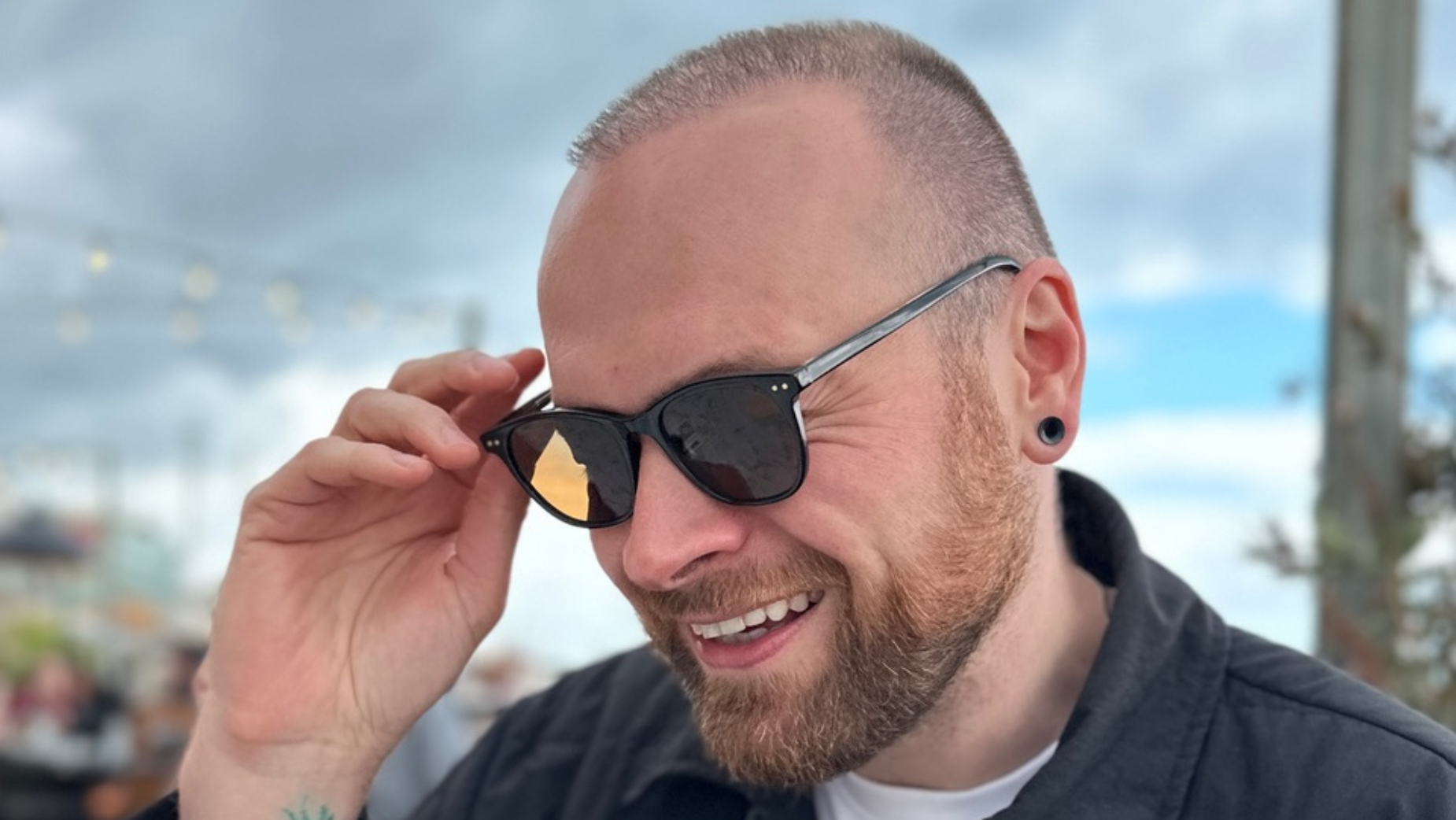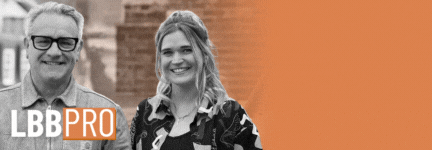
Bossing It: Finding The Balance with Tom Staniford

Tom Staniford is the creative director and managing director of Gusto Film, a creative production agency known for it’s bold, visually stunning films that take brands beyond the expected. Tom first gained industry prominence as director of photography for the Hillsborough charity single, 'He Ain't Heavy, He's My Brother', which claimed the coveted Christmas #1 spot.
With a background in music and a passion for bold visuals, Tom spent nearly a decade as a freelance director and DP collaborating with brands such as Jaguar Land Rover, GQ, Samaritans, and Unilever, earning a prestigious nomination for Agency Partner of the Year. He quickly became a favourite for brands such as Fender, Suzuki, and Cafe Nero, while his emotional storytelling style garnered a strong client base in the charity sector.
In 2019, Tom launched Gusto Film, a creative production agency, based in London and Brighton, that harnesses what they call ‘creative kung-fu’ to elevate the ordinary and produce films with force. Gusto's expertise in blending narrative, mood, and aesthetics has made them a go-to for brands in the FMCG and food / beverage sectors. Their work has earned them global recognition and multiple awards, including four wins at The Drum Chip Shop Awards for the Heinz "It’s a Sin" Christmas spec ad.
Tom is also passionate about supporting the next generation of young filmmakers through The Matchbox Film Awards, an initiative created by Gusto for 16 to 23-year-olds entering the industry. Now in its second year, the event has attracted sponsorship from major brands like Blackmagic Design, Epidemic Sound, and Lucy & Yak.
You can read more about Gusto Film here.
LBB> What was your first experience of leadership?
Tom> Probably Optimus Prime or some fox from Animals of 'Farthing Wood'. They used to really bake in those deep messages of honour, trust and being a good person (or animal/robot) in those cartoons. That stuff really used to stick with me.
LBB> How did you figure out what kind of leader you wanted to be – or what kind of leader you didn’t want to be?
Tom> I never decided “right I want to be this sort of leader” I think that’s determined by who you authentically are. I’ve always soaked up TED talks, autobiographies of people I admire, industry podcasts and all the other bits that help inform you. So naturally, this has shaped me probably since I was 18 when I started getting the itch to grow.
I was told by a mentor once that most leaders sprout from one of two pots. One pot is naturally driven by people, typically putting them before the business, the other is more driven by business goals and hard facts. I’m definitely from the first pot, that’s my natural stance, so for me growth would be spending some healthy time in the other pot too.
LBB> What experience or moment gave you your biggest lesson in leadership?
Tom> When hiring decisions don’t work out, those are the moments that I’m tested most as a leader and learn the most. I’m very much an instinctive person, especially when it comes to people, I trust easily and so I used to be pretty quick to bring someone aboard HMS Gusto.
Inevitably those decisions don’t always work out and letting people go because the fit isn’t right is a really hard thing to do for both parties. I’ve learned to be much more measured and controlled when it comes to hiring, and not just let my heart run wild.
LBB> Did you know you always wanted to take on a leadership role? If so how did you work towards it and if not, when did you start realising that you had it in you?
Tom> I didn’t start with wanting to be a leader, and being a leader isn’t even my pursuit now. I’ve never thought “I want to lead people” it’s just been part and parcel of trying to achieve the dreams I’ve had.
I was the bass player in our school band and was always the one pushing us along to get gigs and write. If I wanted to be a singer-songwriter and record and tour in my twenties, I had to get a plan and a band together too. And now with Gusto, I wanted to create a production company that makes great art, working with good people who love the work they do.
LBB> When it comes to 'leadership' as a skill, how much do you think is a natural part of personality, how much can be taught and learned?
Tom> I do think some people are born leaders, other people not so much and then all the shades of grey in between. I would say that I am somewhere in-between.
I think my charisma helps with being a leader as an innate part of my personality but I’ve also been reading, learning, sponging up as much information as I can about leadership characters or successful people since I was about 16 so I believe a lot of it can be learned.
I certainly don’t think it’s read one book and you’re done, it’s a gradual process of mentoring, absorbing and being very curious and interested in what’s going on around you.
LBB> What are the aspects of leadership that you find most personally challenging? And how do you work through them?
Tom> Flicking the switch between what’s right for our business vs what’s right for our people. And also what’s right for some people may not be right for others! Those are the most challenging waters to navigate. I get through it by talking it out with other peers in the industry, speaking to the team and even a little call to HR (we have an external company). I gather a few different perspectives before making tough calls. Hell, ChatGPT’s even been up in the night with me!
LBB> Have you ever felt like you've failed whilst in charge? How did you address the issue and what did you learn from it?
Tom> Honestly, I can’t remember a time where in business I’ve thought in my head “I’ve failed.” I’m an optimistic person so this phrase really never comes to mind, whether it’s me or the team.
I make small cockups on the frequent - it’s important not to get hung up on the little stuff, but just take accountability and quickly move past it and onwards to the next thing. The worst thing you can do is try to hold on to a flawless track record, never admitting your mistakes and dying on a mountain to protect your pride. I’m a big believer in fail fast, fail often - and don’t let it stop you experimenting, innovating and taking risks!
LBB> In terms of leadership and openness, what’s your approach there? Do you think it’s important to be as transparent as possible in the service of being authentic? Or is there a value in being careful and considered?
Tom> It’s actually a real tightrope walk sometimes. I’m very much a guy who wears his heart on his sleeve, so my go-to is to overshare. I’m also very motivated and sensitive to how people feel, so I’m on a continuous journey of tweaking that balance between the truly unfiltered authentic me, versus the one that’s reigned in.
There’s a really obvious time and a place for both but I think being unafraid to show the real you to your team will go some way to giving them “permission” to bring their full selves too. I think that’s how the best art gets made and makes work a more liberating place to be.
LBB> As you developed your leadership skills did you have a mentor, if so who were/are they and what have you learned? And on the flip side, do you mentor any aspiring leaders and how do you approach that relationship?
Tom> I’ve had several forms of mentors over the years, my dad for sure imparted a lot of wisdom in the early days. Then I had a coach as part of the Natwest Accelerator programme, I think he was 19 at the time! But he did challenge me on some really important areas, he was therapy to me as I started taking on more staff, and he’s crushing it right now.
Then a really big one was Joel Pilger from Revthink, I followed their podcast for years before my business was finally in a position to join their mentor programme. Having Joel felt like a secret weapon, expensive but his mentoring took my leadership and business ahead two-three years.
I’ve actually just started mentoring an aspiring director through the Creative Mentor Network. It’s hard not to approach it all guns blazing like “you can do this, and this and this!” and I have been at times. But at 19 at the very, very beginning of their career I’m constantly reminding myself to be more gentle, by filtering back the absolute hurricane of information I’m excited to project at her.
We’re taking it slow and setting up some calls with other experienced directors to share their career stories with her. She’s absolutely brilliant.
LBB> In continually changing market circumstances, how do you cope with the responsibility of leading a team through difficult waters?
Tom> We have a very transparent workplace. Every Monday we lay everything out on the table and discuss what’s on and the flow of work so everyone’s in the know. But to be frank, we have a really diverse client base and service offering so, thankfully, we’ve not experienced too much turbulence.
In terms of how I actually deal with the responsibility of keeping the lights on and our bellies full, I’m an optimist… BUT we also stash a good runway of cash under the bed. This gives me peace of mind when I’m starting to get concerned, which I promise does happen.
LBB> As a leader, what are some of the ways in which you’ve prioritised diversity and inclusion within your workforce?
Tom> We have a diverse workforce both internally and in terms of our freelance pool. When we crew up we’re always looking at how we can keep that mix diverse and flip some common stereotypes on their heads.
‘Break the Wall’, the programme I’m mentoring on with Creative Mentor Network, helps young creatives from lower socioeconomic backgrounds break into an industry that often requires parental funding, contacts and cultural know-how to get a leg up. There’s a lot more work we can do in this space, but this is a start.
LBB> How important is your company culture to the success of your business? And how have you managed to keep it alive with increases in remote and hybrid working patterns?
Tom> Culture is a big one for me, and for the whole team actually. We’re not the biggest production company out there but one of the things that does make us an attractive place to work is the culture.
The team we’ve got really vibrates with the enthusiastic, positive vibe I’ve always wanted to create in a company, it’s honest, friendly, respectful and playful but everyone works their asses off when they need to. It’s a balance that’s taken quite a few years to get right.
Hybrid working has only made that culture better really, to have time away from each other in the flesh only adds to having a more dynamic relationship with each other in the office and on set. Variety is a blessing.
LBB> What are the most useful resources you’ve found to help you along your leadership journey?
Tom> Speaking to friends and peers in leadership/management roles, wine’ing and dine’ing them and picking their brains is my go to. I’ve also been on a constant drip of books and podcasts but you can’t have a two way conversation with them! Nothing beats sitting in front of someone who’s been there.















